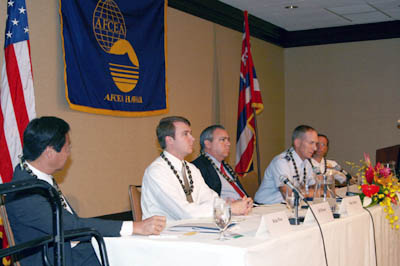 |
| Speakers at the J-3 Panel include (l-r) Brian Woo, State Department adviser to U.S. Pacific Air Forces; Jeff Hensel, State Department Office of Foreign Disaster Assistance; Mike Dorris, counterterrorism specialist, FBI; Maj. Gen. Mike Hostage III, USAF, vice commander, Pacific Air Forces; and panel moderator Rear Adm. Charles W. Martoglio, USN, J-3, U.S. Pacific Command. |
Civil government and the military must work together if the United States is to achieve its strategic aims in the Pacific, said a panel of civil government and military experts. And, meeting those strategic goals increasingly is a matter of "soft power challenges" that involve the military in decidedly non-military actions.
Make no mistake about it: the Free World is in a war to the death. That was the opening statement by J-3 Panel moderator Rear Adm. Charles W. Martoglio, USN, the J-3 of the U.S. Pacific Command. "We are in a fight to the knife. At the end, there will be one group of people standing. They had better be the United States, Europe and the other countries that cherish freedom," the admiral declared.
Defeating those enemies will require combating terrorism outside of war zones, stated FBI counterterrorism expert Mike Dorris. He stated that soft power challenges are the purview of our military leadership, and the American people are looking to the Defense Department to lead in this area.
"With all due respect, humanitarian response is not a Defense Department core competency," said Jeff Hensel of the U.S. State Department Office of Foreign Disaster Assistance. Hensel argued that interagency activities improve military humanitarian responses, and even nongovernmental organizations can provide invaluable assistance in countries not accessible to U.S. forces.
But industry often does not pursue solutions that would help the military, stated Maj. Gen. Mike Hostage III, USAF, vice commander of Pacific Air Forces. The typical business model is to develop a proprietary solution that can be sold to profit the company. The military needs a common data standard that all can subscribe to, along with a common architecture. That desire does not fit the typical business model, he pointed out. Someone must develop a business model that will work with the common rules of the road.





Comments